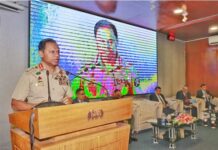By Naimul Haq

BARGUNA, Bangladesh , Feb 9 2013 (IPS) – Monashatoli, a small coastal village of 5,000 residents in Bangladesh’s southwestern Barguna district, located about 470 kilometres south of the capital Dhaka, is a living model of the success of bottom-up community development.
Here, a 15-member committee, elected from among local villagers and comprised primarily of women, oversees development projects from start to finish.
“Our prime focus is to improve the lives of the poor who usually get no opportunities for loans or employment and hardly have any voice in the development of (their) society,” Shiuli Begum, leader of the committee, which is known locally as a ‘gram samiti’ (or village council), told IPS.
To hear a woman in rural Bangladesh speak with pride and knowledge about a development project is not very common. A strong patriarchal culture runs deep in this South Asian country of 150 million people, most of whom live in rural areas, which effectively excludes scores of women from debates on poverty eradication.
But the proliferation over the last decade of a community-driven development model, through which village councils direct development projects, is slowly uprooting traditional ideas – and lifting hundreds from abject poverty.
The government launched its first community driven development (CDD) project back in 2003, with financial support from the World Bank.
Since then, hundreds of local women’s groups have demonstrated that the “poorest of the poor” have the capacity and skills required to manage limited resources, prioritise needs and translate commitments on paper into action.
With this model, “There is no boss — everybody has a voice and it is seriously heard,” A K M Mahbubur Rahman, regional programme director of the Social Development Foundation (SDF) – an independent agency operating under the Finance Ministry – told IPS.
New life
The SDF is currently supervising implementation of the 120-million-dollar World Bank poverty alleviation project called ‘Nuton Jibon’, meaning New Life.
Started in 2003 as a set of pilot projects in the northern Gaibandha district and the north-central Jamalur district, Nuton Jibon has expanded to 16 districts across Bangladesh, enabling over 300,000 extremely poor people to envision and execute changes in their own lives.
In an effort to bring the Bank’s initiative in line with grassroots practices, the SDF works closely with the gram samiti in each village and trains members in capacity building and institutional development with the aim of cultivating local leadership.
“The most amazing thing about CDD is it is highly participatory and there is no external interference. Everyone is free to make and implement decisions in a systematic manner,” Mahbubur Rahman told IPS.
In Monashatoli, for instance, the women-led village council prepares a “social map” of the local community: identifying the size of the population, the number of homes, points of water supply, the quality of roads, and existing infrastructure like school buildings.
The group then makes formal proposals for resources to be added to what is referred to as an institution development fund (IDF), which forms the financial basis for community development projects in strict collaboration with the local government and the private sector.
Funds are allocated for constructing roads and buildings, installing community tube wells, erecting bus terminals, markets and river ports among other things.
By November 2012, the village of Monashatoli had received, in a little over a year, over 8,6oo dollars for projects that included the construction of a 210-metre-long road and the installation of several tube wells, which will serve over 300 families.
Already the model is changing the social fabric in villages across Bangladesh.
Attending a monthly community meeting in the neighbouring Dhewkhandi village, 30-year-old Usha Rani Datta told IPS, “People here show tremendous enthusiasm for development works. Everyone participates in the meetings and wants to do something for the society. This is a huge change.”
“Women who once led restricted lives indoors are now busy executing administrative (tasks) for the development of the community,” said a proud Mukta Nag, a council leader in Dhewkhandi.
As a result of regular monitoring and a “transparent system of checking on all expenditures by a 5-member social audit committee, accountability is always ensured,” Rounak Ferdous, Barguna district programme manager of SDF, told IPS.
Long-term solutions
When Nuton Jibon was first implemented, one of its key goals was to increase long-term employment opportunities by enhancing skills, supporting income generating activities and strengthening access to markets and financial institutions.
With women holding the reins of development projects, credit facilities and skill development programmes have become incredibly popular in rural Bangladesh, where many destitute communities are now using start-up loans to launch small businesses.
Mosammet Rashida, 27, a Monashatoli resident, borrowed 125 dollars to buy a milking cow last year. After making a monthly profit of about 24 dollars from selling milk, she was able to borrow nearly 200 dollars more to expand her business – no small sum in a country where the average monthly wage in rural areas is 60 to 80 dollars.
“Before I joined the gram samity I had resorted to begging on the streets to survive but Nuton Jibon has changed my life,” a smiling Rashida told IPS.
Similarly, 24-year-old Pori Banu borrowed 235 dollars to set up a roadside tea stall. Pori’s husband, Mojibor, a former rickshaw-puller, now runs the shop and earns about 60 dollars a month – double what the family used to earn.
“I have been able to send two of my sons to school, as I can now afford to pay their tuition fees and buy their books,” Pori told IPS.
According to Ousmane Seck, senior rural development specialist for the World Bank in Bangladesh and the team leader of Nuton Jibon, “Our experiences show that women are excellent managers of resources.” Indeed, surveys and reports by various local NGOs show that the default rate among women is less than three percent, making an even stronger case for women’s leadership in the village councils.
By early 2013 the project counted 950 village committees, in addition to some 18,000 small savings and credit groups and 1,600 youth groups, all deciding their own priorities and managing project funds.
Nuton Jibon in the greater Barisal region in south-central Bangladesh has so far disbursed over 12 million dollars for development projects, directly benefiting over five million poor people.
Experts say these macro-level poverty reduction programmes are having a national impact: the latest figures released by the Bangladesh Bureau of Statistics (BBS) show that extreme poverty decreased from 25 percent in 2005 to 17.6 percent in 2010.
Source: IPS










Women – particularly two women aided by many of their species in the cabinet & beyond – have been at the helm of affairs in Bangladesh. And look what a fine mess the country is in today. I am not against women but please please can a real person (man or woman) who loves the country stand up and be counted..